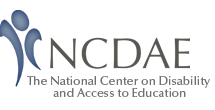About NCDAE
Organization
The National Center on Disability and Access to Education (NCDAE) monitors and promotes electronically-mediated distance education policies and practices that enhance the lives of people with disabilities and their families. The NCDAE is working to further the national agenda necessary to increase opportunities for participation of people with disabilities and addresses: (a) delivery of electronically-mediated content, (b) testing and assessment, and (c) administrative procedures such as registration for educational offerings. NCDAE aims to achieve four goals:
- Conduct policy research pertinent to development of a national agenda to promote universal access in distance education.
- Develop tools to enable accessible electronically-mediated education.
- Provide education about universal access to distance education; this includes training and technical assistance targeted to specific audiences and select institutions of higher education who will improve distance education access.
- Disseminate information in multiple venues to create awareness of issues of access to distance education, provide information about measures to promote universal access, and engage partner agencies and organizations to increase access.
To achieve these goals, NCDAE works with its national affiliate network composed of leaders in education, business and industry, and government.
History
In 2002, staff and faculty at Utah State University approached Utah’s Congressional representatives to discuss the needs of individuals with disabilities and those that provide services to them. It was apparent that initiatives to improve personnel preparation and accessibility of distance education technologies could be undertaken by Utah State University’s Center for Persons with Disabilities and Department of Special Education and Rehabilitation. In 2003, the U.S. Congress awarded funds to initiate the National Center for Disability and Access to Education, located at Utah State University. The congressional authorization mandated the Center to, “improve educational services for all students through distance education technologies.”
NCDAE staff recognize that there are many ways in which individuals with disabilities may be integrated into community life. One of those ways is through the use of technology that removes barriers of time, space, geographical location, and physical barriers such as mobility or sensory impairments. Technology can be used to bring people together in a virtual sense and as a communication medium that is independent of individual physical ability. Distance education technology is increasingly incorporated as a method for offering educational opportunities to all individuals. Using distance education technology to help individuals with disabilities participate in educational opportunities, and using the same technology to prepare professionals to work with individuals with disabilities is the main focus of the National Center for Disability and Access to Education. In this information age, we must ensure that all individuals have equal access and equal opportunity to benefit from technology and that technology is used to meet the needs of all individuals.

